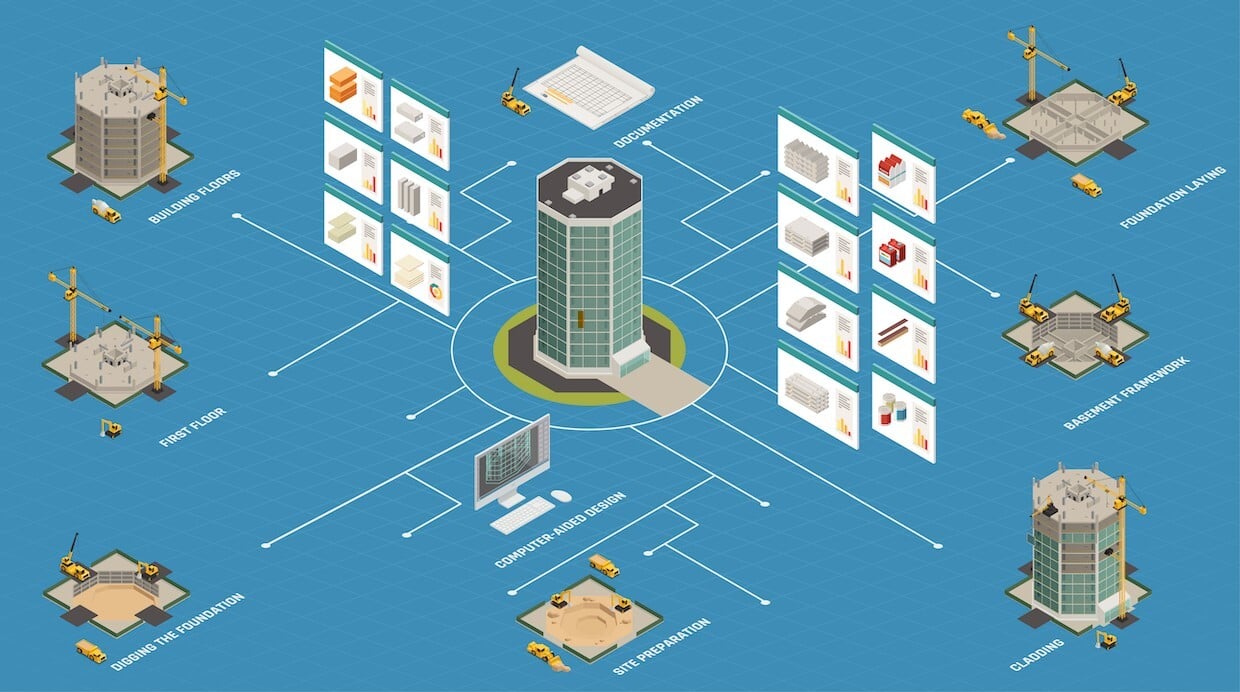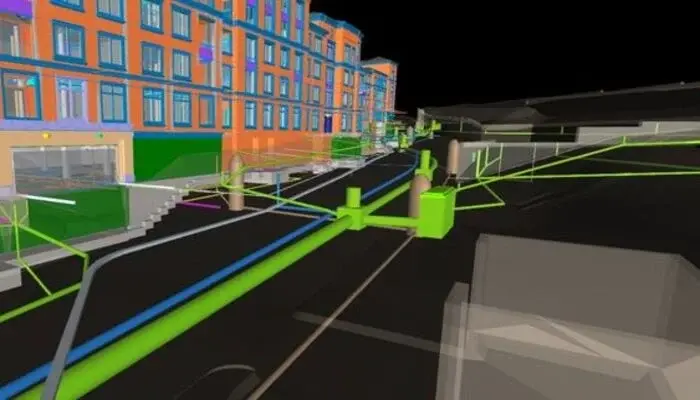
Building information modelling (BIM) is changing the way construction projects are planned, executed and managed in today’s AEC industry. Challenges like exceeding budgets and delays are not seen as problems today because of BIM. The US Building Information Modelling market is projected to grow at a whopping 13.08% from 2026 to 2029. Testament to the growth of BIM and why construction project managers should hop onto the bandwagon.
Put simply, BIM involves the management and creation of a digital model that showcases the functional characteristics of a project. BIM allows designers, construction managers, engineers, contractors, and facility managers to collaborate more effectively and improve the project outcome, especially for large-scale construction projects such as the newly built Chenab Railway Bridge. Naturally, to stay ahead in this competitive market is why construction managers need to learn BIM in 2026. Let’s explore its significance in more detail as we move forward with this read.
Changing Role of Construction Project Managers in the BIM Era
Traditionally, the role of a construction project manager relied heavily on tools such as Gantt charts, man-made schedules, and frequent progress meetings. These were required to monitor tasks and maintain visibility among diverse teams working on the project. While these tools have been handy and have paved the way for cross-functional collaboration, with the addition of BIM and construction project management, the way projects are visualised and coordinated has been reimagined. How? BIM provides a dynamic and digital representation of all stages of the project lifecycle by integrating stakeholders, architects, engineers, contractors, owners, and most importantly, the construction project managers.
This shift has not only streamlined collaboration but also unlocked new capabilities, enabling project managers to lead with greater precision and control.
5 Ways BIM Empowers Construction Product Managers

1. Clash Detection and Risk Mitigation
BIM helps reduce design conflicts, such as pipes clashing with beams, before construction begins. Early detection is crucial because it reduces rework, delays and ultimately decreases the extra costs that come with the extension of projects. For construction project managers, this means fewer unforeseen on-site surprises and a more controlled environment to work in. This shows how BIM is used by construction project managers to reduce risk and delay.
2. 4D BIM for Temporal Visualisation
4D BIM allows construction project managers to integrate time tracking into 3D models. This removes the need to make static schedules and replaces them with dynamic simulations, making it easier for teams to plan and align their work.
3. Enhanced Collaboration and Communication
This is particularly helpful for non-technical stakeholders of the project. BIM adds all the information in one model, offering a clear understanding of work and spreading the decision-making process across the board.
4. Cost Efficiency
Construction management with BIM improves cost control by enabling early-stage clash detection, quantity take-offs, and accurate residential building cost estimations using tools like BIM 360.
5. Sustainability
BIM in construction management supports sustainability through precise material planning, lifecycle assessments, and energy modelling. It helps construction project managers design eco-friendly buildings while reducing construction-related environmental impact.
7 BIM Software Tools Every Construction Project Manager Should Learn

Here are five standout BIM software and tools every construction project manager should learn, often covered in a specialised course in BIM training for construction project managers.
1. Autodesk Revit
Revit is one of the leading Building Information Modelling tools used for 3D modelling and design collaboration. It’s significant for clash detection, construction sequencing, and developing coordinated models used by architects, engineers, and construction project managers alike.
2. Autodesk Navisworks
Autodesk Navisworks works seamlessly with Revit for 4D simulations, model aggregation, and interdisciplinary coordination, which makes it vital for complex and large-scale projects. It helps identify clashes, simulate construction timelines, and optimise construction strategies before breaking ground.
3. Procore
A cloud-based is an integrated solution, covering document control, budgeting, scheduling, and real-time collaboration across the phases of the project. It’s widely adopted across mid-to-large firms and supports mobile access for on-site teams, improving communication and accountability among the teams.
4. Autodesk Build (previously PlanGrid)
This software is used for version control, field documentation, punch lists, and RFI tracking. It makes sure that the teams work from up-to-date plans. The platform supports markups, photo documentation, and daily reports, making the field-to-office workflows streamlined.
5. Microsoft Project
A dynamic scheduling software is taught in many construction management certificate programs. Microsoft is used for making Gantt charts, performing crucial path analysis for error-proof project control, controlling dependencies, and predicting delays.
These five tools aid construction managers in digitally organising budgets, procurement, timelines, documentation, and BIM processes from the beginning to the final result of the project.
6. Civil 3D
Civil 3D helps construction project managers create accurate 3D models, generate precise quantity takeoffs, detect design conflicts early, coordinate with multiple disciplines, and produce construction-ready drawings. It streamlines project workflows, reduces errors, improves cost estimation accuracy, and facilitates better communication between design teams and field crews throughout the construction process.
7. Autodesk Construction Cloud
Autodesk Construction Cloud
centralises project data, enables real-time collaboration between teams, tracks project progress, manages document versions, facilitates field-to-office communication, and provides mobile access to drawings and models. It streamlines workflows, reduces rework, improves accountability, and gives project managers complete visibility into project status, costs, and schedules from anywhere.
Career Benefits for Construction Project Managers with BIM Skills
There’s a reason why construction project management with BIM skills is in high demand in the AEC industry, and this surge comes with benefits in their career. Some of them are as follows:
1. Job Security
BIM adoption is accelerating industry-wide, making these skills essential for future construction projects and career longevity.
2. Expanded Career Opportunities
Access to premium projects, international assignments, and leadership roles in progressive construction firms and tech-forward companies.
3. Improved Project Efficiency
Ability to reduce project timelines through better coordination, clash detection, and streamlined workflows, a clear demonstration of the benefits of BIM for construction project managers’ growth.
4. Future-Ready Positioning
Preparation for emerging technologies like AI integration, automated construction processes, and digital twin implementations in construction management and BIM.
5. Higher Salary Potential
BIM-skilled project managers make a higher income due to specialised expertise and growing market demand for digital construction skills.
How to Learn BIM?

Getting started with BIM doesn’t require you to be a software expert from day one. Instead, it’s about building an understanding of BIM principles, tools, and how they integrate into construction workflows.
Here’s a simple roadmap to begin:
- Know the basics of BIM, including 3D modelling, clash recognition, and lifecycle planning.
- Explore leading BIM tools like Autodesk Revit, Navisworks, and BIM 360 to understand their use in real-world projects.
- Enrol in well-organised courses, focusing on implementing and managing BIM in a construction project.
- Get experience by working on small-scale pilot projects within your organisation or as case studies to gain practical knowledge.
- Keep yourself informed about BIM adoption mandates in the US and trends in sustainable construction.
Novatr’s BIM Professional Course for Civil Engineers is specifically designed to help professionals like you gain mastery in digital construction. The course includes hands-on software training, real-world projects, and industry mentorship. Whether you’re aiming to lead digital site execution or grow into a BIM leadership role in top construction management firms, you can check out Novatr’s course to learn about BIM Curriculum, relevant software tools, and guidance from industry experts to kick-start your BIM career.
What Makes Novatr Different?
- Trusted by Thousands: Join 6,000+ BIM learners from over 45 countries who have successfully graduated from Novatr.
- Expert-Driven Curriculum: Designed through the analysis of 1,000+ job descriptions and rigorously vetted by 200+ global BIM experts.
- Globally Recognised Certifications: Earn certifications from both Autodesk and Novatr, showcasing your verified expertise.
- Proven Career Impact: Learners report an average salary hike after course completion.
Conclusion
Having BIM expertise for construction project managers is no longer an option in 2025; it’s a prerequisite. As the AEC industry moves towards digital transformation, professionals equipped with BIM skills have a clear advantage over those who aren’t. It pushed them towards efficiency, sustainability, and career growth. So, if you want in on the success, now is the time to upskill and lead the future of construction management with the BIM Professional Course for Civil Engineers by Novatr.
Visit our Resources Page to learn about the latest updates and trends doing the rounds in the AEC space.
Was this content helpful to you











